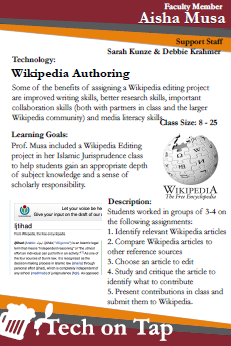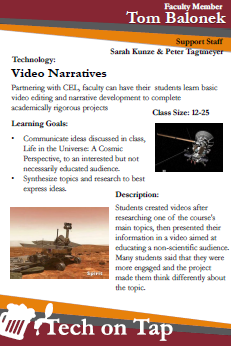 What do you get when you combine technology, 11 faculty posters, and wine, cheese, and crackers? At Colgate’s first “Tech on Tap” event, faculty and staff members gathered in a casual atmosphere to discuss the use of technology in the classroom.
What do you get when you combine technology, 11 faculty posters, and wine, cheese, and crackers? At Colgate’s first “Tech on Tap” event, faculty and staff members gathered in a casual atmosphere to discuss the use of technology in the classroom.
Sponsored by Information Technology Services, the University Libraries, and the Dean of the Faculty’s office, the September 18 event at Donovan’s Pub featured posters about faculty from a broad range of disciplines who successfully integrated technology into their curriculum.
Although many professors discourage the use of Wikipedia for their classes, the web-based encyclopedia became the focal point of Aisha Musa’s Islamic Jurisprudence course.
Musa, assistant professor of religion and Middle Eastern studies and Islamic civilization, designed a set of Wikipedia editing projects that utilized her students’ writing, research, media literacy, and collaboration skills.
After reading published articles by various scholars, her students edited relevant Wikipedia articles for accuracy and comprehensiveness.
“The Wikipedia project is reflective of the way people know things today as opposed to 20 years ago; now we often look to electronic literature instead of published literature. Students need to understand how that knowledge came to be, how reliable it is, and how they can contribute to it,” explained Nancy Pruitt, associate dean of the faculty and professor of biology.
Karen Harpp, associate professor of geology, has been utilizing Google mapping tools in both a geology course and in collaboration with Nancy Ries, professor of anthropology and peace and conflict studies, in the course Weapons and War.
Through use of mapping and geographic visualization tools such as Google Earth and Fusion Tables, students have been able to present research on plate tectonics and landscape analysis and create choropleth maps for the troop locations during Operation Desert Storm and the Korean War.
“While doing these projects, students can learn the content of the field and how to explain their knowledge of the discipline in new ways. This technology helps them develop communication skills for the 21st century,” Pruitt said.
Beyond sparking conversation among faculty, Tech on Tap is part of a larger primary working group in Colgate’s strategic planning process that focuses on the role of technology in teaching and learning.
“A key point of the plan is to use technology to serve a learning goal. I think technology in the curriculum is gaining traction nationwide because students are more technologically savvy than ever and younger faculty want to incorporate the technology skills they used in graduate school and beyond,” said Ray Nardelli, director of plans, projects, and academic technologies.
In order to further the role of technology in the classroom, Colgate is expanding its network by collaborating with other members of the New York Six Liberal Arts Consortium (Hamilton, Skidmore, Hobart and William Smith Colleges, St. Lawrence, and Union).
Pruitt hopes that in the near future, students will be able to benefit from the unique faculty expertise at each college.
“This generation has been engaged with technology from day one. We need to take advantage of their way of knowing the world and use it to help expand the educational experience,” Pruitt said.
To read more about technology in the classroom at Colgate, visit this page.
